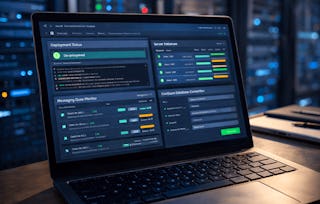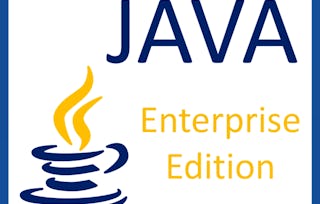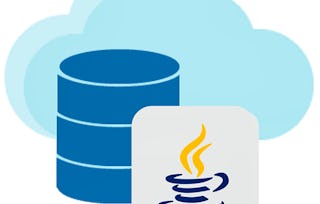The EJB architecture was the first component-based development model for Java EE specification. It consists of three main components; enterprise beans (EJBs), the EJB container, and the Java application server. In this course students will develop EJBs to run it run inside an EJB container, that is running on a Java EE compliant application server. Students will see that EJB Components enables you to build scalable and accessible enterprise applications

Enterprise Java Beans (EJBs) and the Jakarta Persistence API (JPA)

Enterprise Java Beans (EJBs) and the Jakarta Persistence API (JPA)
This course is part of Java Enterprise Edition Specialization

Instructor: LearnQuest Network
5,389 already enrolled
Included with
56 reviews
Recommended experience
Skills you'll gain
Details to know

Add to your LinkedIn profile
7 assignments
See how employees at top companies are mastering in-demand skills

Build your subject-matter expertise
- Learn new concepts from industry experts
- Gain a foundational understanding of a subject or tool
- Develop job-relevant skills with hands-on projects
- Earn a shareable career certificate

There are 4 modules in this course
A Session Bean is the most generic type of enterprise bean, It representing a facet of business functionality that can be called by a client. in the same or different JVM via Local or Remote access respectively. This module will concentrate on the advantages of having the EJB model to build distributed applications and the role of the most common EJB, Stateless Session Beans, that can be pooled for remote clients or sit in the context of a Web Application.
What's included
8 videos2 readings2 assignments1 discussion prompt3 ungraded labs2 plugins
This module will introduce the use of Interceptors to trace interactions with EJB's. Defining re-useable Interceptor Classes for multiple EJB or defining specific method level Interceptor methods with an EJB itself. It will also contain the Exam for modules 1 and 2
What's included
2 videos1 assignment1 ungraded lab
In this module, state will be discussed via the use of Singleton and Stateful Session Beans scoped to a client conversation. It will then move onto Jakarta Persistence or Java Persistence Architecture (JPA) to cover how in a Java EE application we communicate with Databases.
What's included
10 videos2 readings2 assignments3 ungraded labs2 plugins
This module will illustrate the use of Message Driven Beans (MDB) for the Java Messaging System (JMS) to aid in the communication between disparate systems through asynchronous message queues. It will also contain the Exam for modules 3 and 4
What's included
5 videos1 reading2 assignments1 discussion prompt2 ungraded labs
Earn a career certificate
Add this credential to your LinkedIn profile, resume, or CV. Share it on social media and in your performance review.
Instructor

Offered by
Explore more from Software Development
 Status: Preview
Status: Preview Status: Preview
Status: Preview Status: Free Trial
Status: Free Trial Status: Free Trial
Status: Free TrialLearnQuest
Why people choose Coursera for their career

Felipe M.

Jennifer J.

Larry W.

Chaitanya A.
Learner reviews
- 5 stars
87.50%
- 4 stars
7.14%
- 3 stars
1.78%
- 2 stars
1.78%
- 1 star
1.78%
Showing 3 of 56
Reviewed on Sep 28, 2024
je veux ma certificat de java EE , jai fais mon abonemment et j ai terminer mon cours , et je veux recevoir la certificat

Open new doors with Coursera Plus
Unlimited access to 10,000+ world-class courses, hands-on projects, and job-ready certificate programs - all included in your subscription
Advance your career with an online degree
Earn a degree from world-class universities - 100% online
Join over 3,400 global companies that choose Coursera for Business
Upskill your employees to excel in the digital economy
Frequently asked questions
To access the course materials, assignments and to earn a Certificate, you will need to purchase the Certificate experience when you enroll in a course. You can try a Free Trial instead, or apply for Financial Aid. The course may offer 'Full Course, No Certificate' instead. This option lets you see all course materials, submit required assessments, and get a final grade. This also means that you will not be able to purchase a Certificate experience.
When you enroll in the course, you get access to all of the courses in the Specialization, and you earn a certificate when you complete the work. Your electronic Certificate will be added to your Accomplishments page - from there, you can print your Certificate or add it to your LinkedIn profile.
Yes. In select learning programs, you can apply for financial aid or a scholarship if you can’t afford the enrollment fee. If fin aid or scholarship is available for your learning program selection, you’ll find a link to apply on the description page.
More questions
Financial aid available,

